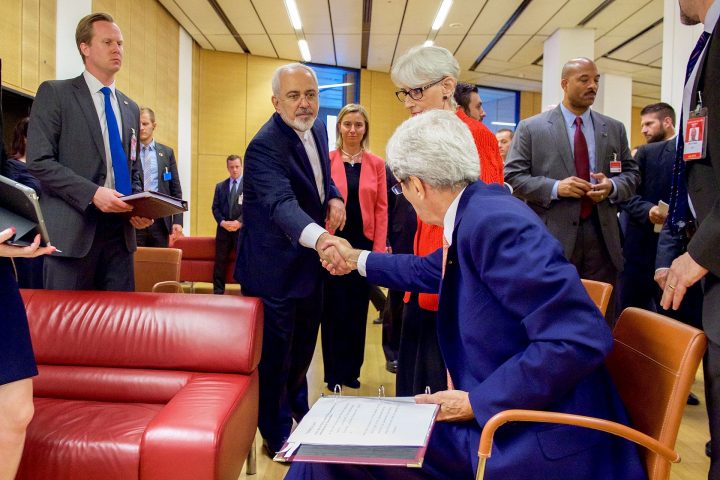Natasha Lindstaedt, University of Essex for The Conversation
After Iran shot down a US drone that allegedly entered Iran’s airspace, Donald Trump signed new sanctions against Iran on June 24, including against its supreme leader, Ali Khamenei. The move came days after the US president took to Twitter to reveal the US had been ten minutes away from striking back at Iran, but reversed course when Trump found out that 150 people could be killed.
Iran’s recent provocation came after a series of attacks in the busy Strait of Hormuz and the sabotage of four vessels travelling through the strait in May. Iran was accused of ramping up its sabotage activity – with experts pointing to Iran’s involvement due to the precision of the attacks.
Before Trump assumed office, tensions between Iran and the US were finally starting to thaw. This was largely due to the 2015 Joint Comprehensive Plan of Action, better known as the Iran nuclear deal, an agreement involving Iran, the US, UK, France, China, Russia and Germany, which aimed to block Iran from building nuclear weapons in exchange for sanctions relief.
Despite Trump’s former secretary of defence, James Mattis, testifying to a senate committee that Iran was adhering to the deal in April 2018, the president believed he needed to undo one of the signature policies of the Obama administration – arguing that doing so would bring Iran to its knees. He withdrew the US from the deal in early May 2018, saying it: “Didn’t bring calm, it didn’t bring peace, and it never will.”
No plan B
But rather than bringing Iran to its knees, Trump’s decision has emboldened Iran to take on more risks. Iran has absolutely nothing to lose and the approach advocated by moderates within the Iranian regime to co-operate with the West has clearly failed. By pulling out of the deal, Trump has no plan B and offers no options for Iran other than to engage in bad behaviour. If Iran believes that complying with international agreements is rewarded in this way, it could lose faith in the benefits of co-operating with the international community at all.
On June 23, Trump indicated he wants to talk to the Iranians and sent two envoys to the region, including secretary of state, Mike Pompeo. But Khamenei is adamant that no talks will take place unless sanctions against Iran are lifted. Iran’s foreign policy spokesperson, Abbas Mousavi, tweeted on June 24 that imposing sanction against Khamenei: “Is the permanent closure of the path of diplomacy.”
Unlike Trump, whose foreign policy has no focus and seems to change course based on his mood, few leaders have a more singular focus than Khamenei. His 30 years in power have been guided by an implacable single vision of resisting US hegemony and imperialism at any cost. Unlike Kim Jong Un of North Korea, Khamenei has no interest in a historic photo-op with the president.
Additionally powerful are the Iranian Revolutionary Guard Corps (IRGC). Originally formed after the 1979 Iranian revolution as a paramilitary organisation designed to protect the regime against coup attempts, the IRGC has grown into the most powerful organisation in Iran, dictating Iranian foreign policy and domestic politics. It is as resolute as Khamenei in its commitment to fight against what it perceives to be US arrogance.
In contrast, Trump has no clear foreign policy and no coherent process for national security decision making within his administration, as recent events demonstrate. One moment Trump threatened to destroy Iran, the next moment he made apologies for Iran, claiming the drone attack may have been made in error and that he wanted to engage in talks.
Such an erratic approach of provoking a conflict, pushing things to the brink and assuming that others will cave in may work in the world of business, but it doesn’t work in foreign policy. Iran is responding to the uncertainty by taking bigger risks and sowing more chaos in the region. The recent escalation of tensions has made Iran’s leadership more resolute than ever to fight against US aggression. The Iranian regime also understands that Trump wants to avoid a surge in oil prices, which usually happens when tensions rise in the region.
More sanctions won’t work
But the hawks within Trump’s administration, such as the national security adviser, John Bolton, believe a war with Iran is necessary. The US has far greater military capabilities than Iran, whose oil industry is vulnerable to attack. It’s also true that Iran’s economy has been struggling with 13% unemployment, growth rates at under 2% and inflation at 52%. However, Iran’s economy has struggled in similar ways before and regime change has not taken place.
The sanctions, which are designed to cripple the Iranian economy, have undermined the middle class and small businesses that are most critical to pushing for positive change, while lining the pockets of the hardliners and justifying their position. The IRGC, designated as a terrorist organisation by Trump in April, is benefiting from the sanctions because of its heavy involvement in black market activity such as petroleum smuggling. Wider studies on sanctions show that they are only effective against dictatorships built around the personality of a strong leader and have little effect in regimes where dictatorships are more institutionalised.
The further ramping up of sanctions is highly unlikely to force Iran to back down and commit to talks – or to prevent future attacks that are difficult to directly attribute to Iran. Given the importance and single-mindedness of Iran’s ideology, its leaders will only accept some form of face-saving diplomacy, most notably that the US does a complete U-turn and recommits to the Iran nuclear deal.![]()
Natasha Lindstaedt, Professor, Department of Government, University of Essex
This article is republished from The Conversation under a Creative Commons license. Read the original article.










